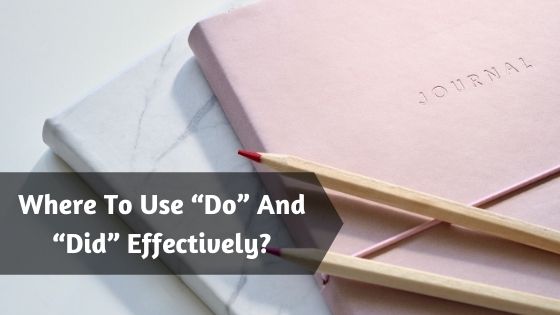“Do” is an irregular verb with three irregular forms, namely, “do, did, and done.” It also has a present simple form “does.” “Do” is used most effectively in the form of a question. For example – “where do you live? Or what do you do?” It is more commonly used as a main, auxiliary, and substitute verb.


As a main verb, “do” is used to take part or perform an action. Some of the examples include:
- Is there anything I can do for you?
- There is nothing anyone can do about it.
- What did you do?
Similarly, “do” is also used to deal, achieve, complete something. For example:
- What should I do after washing the dishes?
- We do have to celebrate after getting our results.
In addition to this, many times, “Do” is used jointly with nouns like work, job, homework, etc. For example:
- She has a lot on her plate to do tonight.
- I am going to do some work on my physique this weekend.
- What does he do?
Universities also use “do” to studying subjects. For example:
- All students have to do English during their primary schooling.
- What did you do at your college?
It also comes handy while using nouns like a copy, design, painting, drawing, and informal speech. For example:
- Can you do this copy for me?
- Who do you think would be a better designer for the website?
“Do” is also an auxiliary verb aside from “be and have.” It is used to state negative messages with “not,” develop a question, and make a verb even more empathetic. For example:
- Do they remain open on weekends?
- I don’t (do not) believe you.
- She does look astonishing in her prom dress.
- Lastly, “do” is used as a substitute verb to avoid word repetition in clauses. For example:
He told everyone about his moving plans, but no one believed him. But when did do so, everyone seemed shockingly surprised.
I had to call the police when I politely asked everyone to leave the club, but they didn’t do so.
I do it almost all the time.
On the other hand, “did” is a past tense of “do.” Therefore, it is mostly used in sentences to enquire, replace, or state a past action. For example:
- I did my assignment.
- He didn’t (did not) arrive on time.
- What did he do to get fired?
The other ideal use of “did” is to state an emphasis. For example:
- I did my work before time.
- I didn’t want to go to the concert.
- Didn’t you speak with the psychiatrist last week?
- How much did he score?
As you might have noticed, “did” is often used in conversations to invoke questions. For example:
- Why did you get in a fight?
- When did you make plans for our honeymoon?
- What did you do last winter to keep the snow away from the house?
Therefore, “did” is used in all similar ways as “do,” but mostly in the past tense, state action, negativeness, and emphasis.
If you really want to know the actual difference, search for our best IELTS coaching in Gurgaon.







